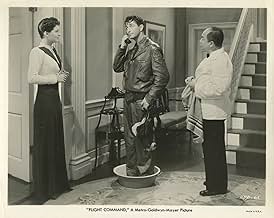"Flight Command" was shown as part of the TCM Memorial Day series, and it deserves to be remembered for its excellent performances by the leads and all the supporting players, as well as the air scenes of single-engine planes flown by the squadron of Navy pilots. There is a lesson in their comraderie which is all the more moving when one considers the 1940 date and the skilful stuntwork of the planes for its time. Walter Pidgeon gives a classic performance, both strong and vulnerable, for which he will become better known in later films, and Ruth Hussey, usually in a secondary role, puts in a sensitive and generous performance as the "skipper's" stalwart wife in a part that could have been given to Myrna Loy. I am not a fan of Robert Taylor, but I felt he gave one of the more honest of his performances, and his good looks did not for once detract. Ruth's brother in the film, Shepperd Strudwick, hardly a known name, was well-cast as the outgoing, daring inventor working on a fog-navigating device. Between Pidgeon's Apollonian personality and Taylor's Dyonisian charm, Strudwick's relaxed and interestingly handsome face reminded me of Joseph Cotton in having a natural sense of gravitas in his manner.
Even though the plot was not a complex one, the different character relationships, whether between the pilots themselves, or of the perceived triangle of Taylor, Hussey and Pidgeon, was sensitively handled, and the several tricky maneuvers demanded of the pilots kept me glued to the screen. Credit should be given to the director, Frank Borzage, for coaxing such balanced performances from the cast. As for the supporting roles, Paul Kelley and Red Skelton (apparently in his first film appearance) both deserve mention, as do the script writers. The situations and dialogue appear routine, but nothing that is said or done is hackneyed or banal.
Of four ****, I would give it a highly recommended three***.






































